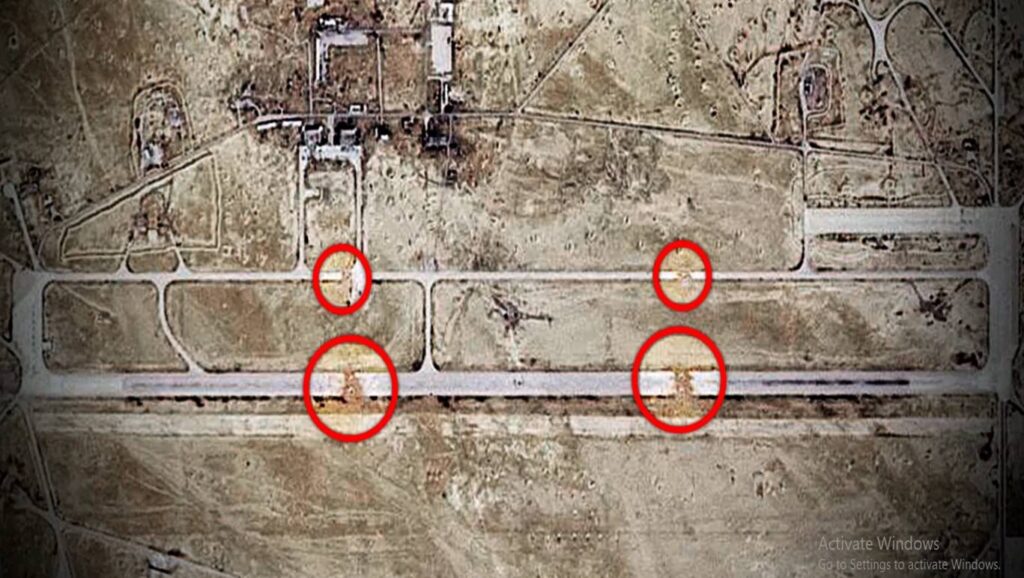GistNexus – April 3, 2025.
Israeli military sites conducted airstrikes against a number of Syrian military facilities on Wednesday, including airbases in the capital city of Damascus and central Syria’s province of Hama. This is a heightening of tensions between Israel and Turkey in the face of threats from Ankara to establish a military presence in Syria, especially at the T4 airbase. These were executed by the Israeli Defense Forces (IDF), targeting crucial Syrian infrastructure including airfields and military bases, thus making it even more complex for any future Turkish operation in the region to take place.

Israeli Air Strike Targets
As per reports published by the Israeli army, the air attacks targeted what they described as “military capabilities” at various strategic points across Syria. These were at Damascus and the T4 military base in Homs province, along with military sites around the city of Hama. The airstrikes also apparently hit about a scientific research center in Damascus’s Barzeh neighborhood, which Israeli forces have attacked previously due to its alleged connections to missile and chemical weapons development.
Related Trending News
Israel and Hamas have Reached “Gaza” Cease-Fire Deal: What Next?
Syria’s Response to the Attacks
Syria denounced Israel’s actions forcefully in reaction to the airstrikes as a “blatant violation” of its sovereignty and international law. The Syrian Ministry of Foreign Affairs described the Israeli strikes as an “unjustified escalation,” accusing Israel of attempting to destabilize the country and exacerbate the suffering of the Syrian people. Syrian state media reported the attack heavily damaged the Hama military airport, rendering it unusable and injuring both civilians and military personnel. The bombardment of Damascus’s Barzeh neighborhood also inflicted heavy damage.
The Syrian regime emphasized that the strikes were part of a comprehensive Israeli strategy to prevent weapons from being delivered to Israel’s assumed enemy forces in Syria. That is consistent with Israel’s officially articulated goal to prevent Iran and Hezbollah, both regarded by it as a direct security threat, from expanding their sway in the region.
The Importance of the Barzeh Research Center
The Barzeh Scientific Research Centre in Damascus’ northern region has been the victim of frequent Israeli attacks over many years. Israel has made countless claims that the centre is used for the development of sophisticated arms, such as guided missiles and chemical weapons. Those allegations became more plausible as a result of airstrikes on 8 December following the death of Syrian President Bashar al-Assad. Ever since Assad’s ouster, Israel has carried out numerous airstrikes across Syria, the majority of them targeting facilities tied to Iranian and Hezbollah presence.
The Syrian Observatory for Human Rights (SOHR), a UK-based monitoring group, announced that Israel launched over 500 airstrikes in Syria between December 8 and December 31, 2024. The airstrikes were part of the overall campaign aimed at thwarting the destruction of Iran’s military infrastructure in Syria, including storage and transfer of advanced weapons and ammunition.
Impact on Syria’s Military Infrastructure
The recent Israeli airstrikes have greatly helped in destroying Syria’s military infrastructure. The T4 military base attack in the Homs province, for example, destroyed key military facilities, including planes, airports, and towers used for communications. The airbase is now reported to be out of commission, thereby further weakening the operational capabilities of the Syrian military. The Hama military airport attacks have also left the airbase seriously damaged and largely not operational.
These air raids, according to SOHR, caused casualties, including the deaths of at least four individuals, who were Syrian defense ministry officials. The devastation of Syria’s military infrastructure, in addition to ongoing internal strife and international sanctions, continues to erode the country’s attempts to recover from decades of civil war.
The Role of Turkey and the T4 Airfield
One of the most significant geopolitical causes of recent Israeli airstrikes is growing tension between Israel and Turkey over the Syrian conflict. Turkey has developed an interest in basing military troops at the T4 airbase, a central Syrian strategic airbase that has seen numerous Israeli airstrikes. Israel views any Turkish military presence at T4 as a threat to its operations in the region, particularly since the airfield is near Israeli-held territories.
Recent reports of developments have indicated that Turkey may divert the T4 airbase for military deployment, air defense, and military equipment, making Israeli military operations in the region more difficult. If Turkey seizes control of the T4 airfield, Israel would be compelled into serious operational challenges, as diverting its airstrikes and military strategies in the region would distract it from establishing clear military goals.
In anticipation of such potential challenges, Israel has stepped up its strikes against Syrian airbases in the hope of preventing any foreign power, including Turkey, from gaining a foothold in the region. The Israeli government has clearly indicated that it will continue to take military action in order to protect its interests and ensure that aggressive forces do not gain a foothold in strategic locations in Syria.
The International Reaction to Israeli Attacks
Israel’s recent bombing of Syria has been criticized by several world players. The head of European Union foreign policy, Kaja Kallas, criticized the impact of Israeli bombing on Syria’s stability last month while in Jerusalem. Kallas termed the bombings as “unnecessary” and stated that they would continue to fuel tensions in the region.
The Western powers, including the United States, have also condemned the situation, with some exhibiting sympathy towards the necessity for Israel to defend itself against threats inside Syria. Yet there is a growing fear the strikes will make the region still more unstable, especially since Syria is still reconstructing after the years of warfare.
Related Trending News
Israel and Hamas have Reached “Gaza” Cease-Fire Deal: What Next?
The United Nations has also been concerned about the impact that Israel’s military actions have had on civilians in Syria. The UN has called for restraint on both sides and respect for international law and human rights.
Israel’s Continued Campaign Against Iranian and Hezbollah Troops
Israel’s activities in Syria are primarily aimed at stopping Iran and Hezbollah’s presence in the country because both have established a significant presence. Israel has repeatedly bombed sites suspected of being associated with Iranian military presence, including weapon depots, missile bases, and supply routes. Hezbollah, an Iranian-backed Lebanese militant group, has also been a priority target of Israeli attacks, since the group is seen as a potential threat to Israeli security.
Israel has, over the last few months, devoted increasing interest to military bases in southern Syria, particularly near the Golan Heights, which Israel annexed in 1981. Israel’s government has insisted on the complete demilitarization of southern Syria to prevent the existence of enemy military forces on its border.
Syria’s Struggle for Stability
While Syria continues to grapple with the consequences of a devastating civil war, the recent Israeli attacks have contributed to the country’s misfortunes. Israel has been accused by the Syrian government of intentionally sabotaging its reconstruction process and its attempts to rebuild vital infrastructure. The violence cycle has displaced millions of Syrians who need humanitarian aid while still continuing to fuel the crisis that has plagued the country for over a decade.
Despite such challenges, the Syrian government remains adamant about resisting foreign interference in its affairs, primarily from Israel. The country has vowed to continue working on the process of restoring and reclaiming its land despite external threats in the shape of military pressure and internal ones.
The Escalating Conflict in Syria
Israel’s recent bombing raids against Syria are but one part of a broader regional struggle for power and domination. The bombings have targeted key military installations, disrupted Syrian military operations, and raised tensions with Turkey, one of the leading protagonists in the Syrian civil war. As things proceed, the global community will be intently watching, with potential for further escalation in the extremely volatile region.
Related Trending News
Israel and Hamas have Reached “Gaza” Cease-Fire Deal: What Next?

Reported by GistNexus Team and Edited by Mr. Chibueze Onwuka
